

First Amendment and Censorship. First Amendment Resources | Statements & Core Documents | Publications & Guidelines “Congress shall make no law respecting an establishment of religion, or prohibiting the free exercise thereof; or abridging the freedom of speech, or of the press; or the right of the people peaceably to assemble, and to petition the Government for a redress of grievances.”
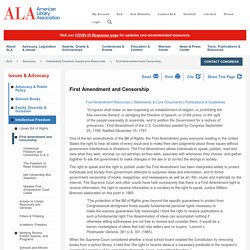
First Amendment of the U.S. Constitution passed by Congress September 25, 1789. Ratified December 15, 1791. One of the ten amendments of the Bill of Rights, the First Amendment gives everyone residing in the United States the right to hear all sides of every issue and to make their own judgments about those issues without government interference or limitations. Public schools and public libraries, as public institutions, have been the setting for legal battles about student access to books, removal or retention of “offensive” material, regulation of patron behavior, and limitations on public access to the internet. What is Censorship? Intellectual Freedom: Issues and Resources. A commitment to intellectual freedom transforms your library.
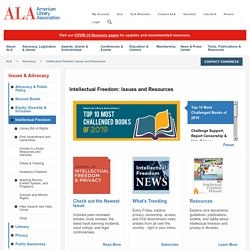
ALA actively advocates and educates in defense of intellectual freedom—the rights of library users to read, seek information, and speak freely as guaranteed by the First Amendment. Intellectual freedom is a core value of the library profession, and a basic right in our democratic society. A publicly supported library provides free, equitable, and confidential access to information for all people of its community. Assistance and Consultation. Free Material - Copyright. 14.
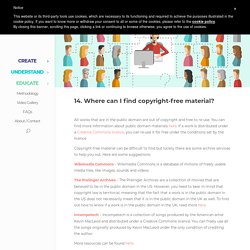
Where can I find copyright-free material? All works that are in the public domain are out of copyright and free to re-use. You can find more information about public domain materials here. If a work is distributed under a Creative Commons licence, you can re-use it for free under the conditions set by the licence. ALA Library Fact Sheet 7 - Video and Copyright. This fact sheet contains information from two sources: The Copyright Primer for Librarians and Educators, Second Edition by Janis H.
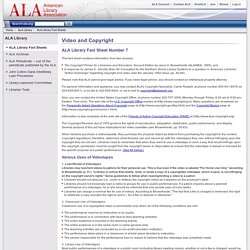
Bruwelheide (ALA/NEA, 1995), and A response by James C. Scholtz (then AV Consultant for the Northern Illinois Library System) to a question in American Libraries' "Action Exchange" regarding copyright and video (see the January 1992 issue, pp. 45-46). Please note that ALA cannot give legal advice. If you need legal advice, you should contact an intellectual property attorney. For general information and guidance, you may contact ALA's Copyright Specialist, Carrie Russell, at phone number 800-941-8478 (or 202-628-8421), or by fax to 202-628-8424, or via e-mail to copyright@alawash.org.
When we share, everyone wins. Fair Use Evaluator. What this tool can do for you: What this tool cannot do for you:
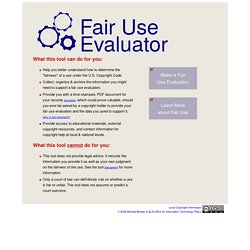
Find free and fair use photos. Programs. You can also download the PDF version of this code.
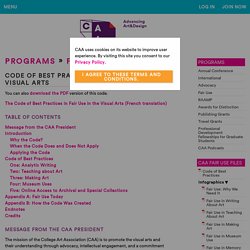
The Code of Best Practices in Fair Use in the Visual Arts (French translation) Message from the CAA President Introduction Why the Code? When the Code Does and Does Not Apply Applying the Code Code of Best Practices One: Analytic Writing Two: Teaching about Art Three: Making Art Four: Museum Uses Five: Online Access to Archival and Special Collections Appendix A: Fair Use Today Appendix B: How the Code Was Created Endnotes Credits The mission of the College Art Association (CAA) is to promote the visual arts and their understanding through advocacy, intellectual engagement, and a commitment to the diversity of practices and practitioners.
Find free-to-use images - Google Search Help. When you do a Google Search, you can filter your results to find images, videos, or text that you have permission to use.
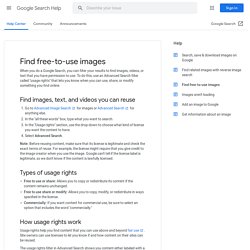
To do this, use an Advanced Search filter called "usage rights" that lets you know when you can use, share, or modify something you find online. Find images, text, and videos you can reuse Go to Advanced Image Search for images or Advanced Search for anything else. In the "all these words" box, type what you want to search. In the "Usage rights" section, use the drop-down to choose what kind of license you want the content to have. Note: Before reusing content, make sure that its license is legitimate and check the exact terms of reuse. Types of usage rights Free to use or share: Allows you to copy or redistribute its content if the content remains unchanged. How usage rights work Usage rights help you find content that you can use above and beyond fair use. Report incorrect usage rights. The Internet Archive Digital Library : Great Libraries of the World : Free Download, Borrow, and Streaming.